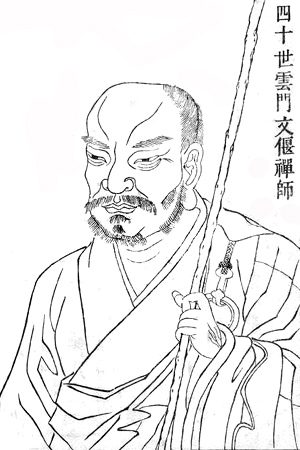Yunmen’s Dried Shit Stick
James Ishmael Ford
A student of the way asked Yunmen, “What is Buddha?”
Yunmen replied, “Dried shitstick.”
Case 21, Gateless Gate
Yunmen is one of the great teachers of the Zen way. He lived between the middle of the ninth century and died late in the middle of the tenth century. The story of his awakening is one of the classics.
After traveling from teacher to teacher, following hints and suggestions he came to master Bokushu’s solitary hut. He was met by the master himself, who opened the door, looked at the student, and shut the door in his face. Yunmen knocked a second time, the master opened the door, looked at him again, and shut the door in his face again. Yunmen knocked again. This time when the master opened the door he set his foot in the door jam. Bokushu looked down, looked up and said, Speak!” Yunmen hesitated and the master slammed the door shut, breaking Yunmen’s foot.
And. And in that moment when his foot broke Yunmen saw into the fundamental matter. He would carry the mark of this encounter for the rest of life as a severe limp.
As I said Yunmen would become one of the great teachers of his time, with more than sixty Dharma successors. His line would eventually become one of the tributaries of the Linji line, the Rinzai school in Japan.
As a teacher he was often just as direct as Bokushu. And often to great effect.
For instance that dried shit stick is a response to one of the great setups of the Zen koan tradition. In the Gateless Gate that question “Who or what is Buddha?” is asked and answered, if I recall correctly, four times. One of these is “three pounds of flax,” while another is “this very mind is Buddha.”
The one response may seem a complete non sequitur, while the other feels too philosophical for a Zen koan answer. And, this one, particularly for anyone used to reading spiritual literature can be unsettling. The scatological response is so unspiritual. At least outside Zen circles. Actually I’ve seen Zen teachers play up that unsettling with considerable gusto. I recall once attending a talk given by the Korean Zen master Seung Sahn, who addressed this koan. His accent was heavy, and in order to make sure his audience understood what he was saying, and I found it hard not to miss the possibility of playing it up, he leaned slightly to one side and pointed toward his bottom, saying “shit, shit…” As I recall over the many years between that moment and as I write this, he smiled slightly as he pointed and repeated “shit.” A small smile, almost a smirk.
Shit. Shit stick as in a corncob, shit stick as in toilet paper.
I’ve seen some commentators assert that the shit stick has no intrinsic meaning. The intent is, in fact, to shock. I don’t really think so. The playing it up, the leaning over and pointing at one’s butt, is playfully drawing us toward something. And it is not to meaninglessness. Nor is it iconoclasm, a deliberate mocking of spiritual conventions. No more so than three pounds of flax, and no less so than this very mind is Buddha. The point lies elsewhere.
In some ways this response is a bit like Mu. A brief word or phrase where the meaning of that word has been vacated, and the sound, the noise itself is the presentation. It is also an invitation. A principle of koan engagement is assuming a direct pointing, and with that an invitation into intimacy. And, often, that pointing and that invitation comes from what seems to be left field.
In fact we are getting a direct meeting of the question. And we need to start with the question. People come in every condition. Sometimes our questions are showing off what we know, or think we know. Sometimes our questions are buying time until we get the lay of the land. Sometimes we’re so out to sea we haven’t a clue, and our questions are the real non sequiturs. And sometimes, we are ripe, and our questions are burning, and with them we are our reaching out trying to touch the real matter.
Sekida Katsuki, one of Robert Atiken’s teachers says of this case, “The student asks seriously, ‘What is Buddha?’ Perhaps he is imagining the glorious image of the Buddha pervading the whole universe. The answer comes like a blow to smash such a thing. This kind of answer is called ‘breaking the thinking stream of consciousness.’” Whether there’s an attachment to the pure, Yunmen was famous for meeting people where they were. And, I find this precisely that, fixing the lid to the box.
In that spirit of matching box and lid, Writer Toni Bernhard connects a poem by Robert Aitken, written when he was a prisoner in a Japanese internment camp during the Second World War, to Sensei Sekida’s comment.
In fermenting night soil
Fat white maggots
Stream with Buddhahood.
I’m very taken with that. Shit. Night soil. Fat white maggots. And that steaming, fecund Buddhahood.
While the primary pointing is, well, to the primary point, we can also catch other hints of possibility, of the richness that is this way.
All of it, all of our lives are the stuff of our awakening. Even the shit. All the different kinds of shit. Our brokenness, our failures, our addictions.
All of it, steaming with Buddhahood. And that takes us back to the primary point. The ingredients of our lives are also the ingredients of our awakening.
Toilet paper. Corncob. Shit stick.
Just this.













